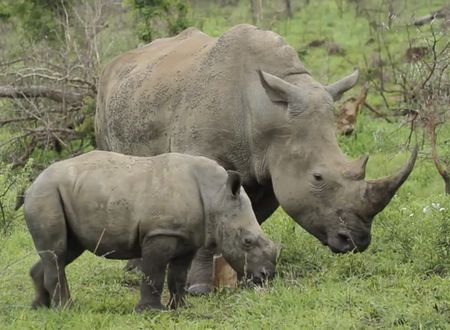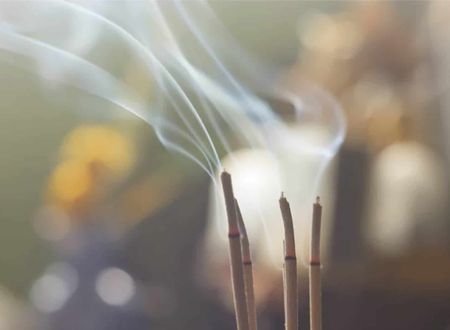The mind is easily distracted by new people or objects that come into our lives. In the process, we may unintentionally hurt our loved ones by either letting go of them or trying to change them. But is this what love really is? Through a short story on Buddha, the following post offers some unique insight into the value of our relationship with loved ones and how distractions are worth but a fistful of rice.
Once upon a time, Buddha was walking along the riverside with nine of his monk disciples. In his quiet and graceful manner, the sage was talking to Ananda about mindfulness when suddenly almost all the monks stopped and looked the other way, across the river, in great awe.
There he was, a yogi crossing the river from the other side and coming towards theirs. Ordinarily, this would not have been a distracting sight. Especially, considering that Buddha was delivering a sermon on mindfulness. This yogi, however, was not crossing the river in a boat, he wasn’t even swimming across, he was simply walking on the water.
The monks couldn’t contain their surprise, and interrupting Buddha, they said, “Do you see that, Lord? This is a miracle of miracles. That yogi must be a Siddha too.”
Buddha remained unimpressed and choosing not to answer their question, he kept walking. All but Ananda stayed behind.
As soon as the yogi reached this side of the river, the monks fell at his feet to seek his blessings.
“Tell us, O Perfected One,” they spoke, “how did you attain the supernatural power of walking on water?”
The yogi beamed in pride while they continued, “Can we also walk on water like you?”
“Yes, you can,” he said. “If you walk my path with discipline for 20 years, you too can walk on water like me.”
“20 years!” They exclaimed in unison.
Their enthusiasm died right away. Who on earth would have the tenacity to lead an austere life for 20 years? they thought. No doubt, it was attractive but the price was too big to pay — two decades of discipline. Two of them joined him nevertheless while the rest offered their obeisances quickly and ran towards Buddha who was now quiet and gently walking towards a boatman.
“O Sage!” they said, “That great yogi said we can walk on water by practicing austerities for 20 years. It was very impressive indeed. But, we thought you must know of an easier method.”
Buddha paused for a moment, looked at their excited faces with his perfected gaze, and resumed walking.
“Will you take us across the river, O nobleman,” he said to the boatman.
“Yes, sir,” he said, “but, it’ll cost you a fistful of rice.”
They agreed and boarded the boat. The boatman was quietly rowing when in the middle of the river, Buddha broke the silence.
“That’s all it is worth, my spiritual sons,” he said. “That great yogi’s 20 years of austerities are worth a fistful of rice.”
The monks dropped their heads in shame. No, not because they were impressed with the yogi, that was natural. But because, one simple distraction and they had so easily forgone their own master.
“You have to choose,” spoke Buddha, “you have to make choices in life, monks. Everything depends on your choices and subsequent actions. You can hanker after some powers to impress a few or you can lead a life of meaning and help everyone in Creation. It’s entirely up to you.”
“Forgive us, Tathagata, for our mistake. We don’t even deserve to be your disciples because we saw just one siddhi and called that yogi a perfected one too.”
Buddha maintained his silence, they got off the boat and Ananda handed the boatman his dues — a fistful of rice.
There are many disciples among us. We see one quality in someone and we forget all about the one who’s stood by us. We are eager to give the new person the same status because their one thing appealed to us. In doing so, we forget years of care, the bond memories with our loved ones. We forego the wise, selfless Buddha for a mere display of some power by someone we just met.
A man or a woman talks to you nicely, gives you attention, for a few minutes and you go home and tell your partner how nice this person was and how your wife or husband should also aim to be like them. By doing so, we reduce their years of effort to a mere handful of rice. Be like her, dress like her, eat like him, earn like him, behave like so-and-so, and so on. Most of us, like the disciples, are eternally getting impressed with the siddhis of other yogis and asking Buddha to behave like them.
Not just disciples, there are many yogis among us too. In fact, in this day and age, we have more yogis than we ever did in the history of our race. But, today we have a different kind of them. Many of us, like the yogi, spend our entire life working on stuff worth no more than a fistful of rice.
Ignoring the sermon of love, disregarding our personal happiness and trampling over our emotional needs, at the cost of our health, we are working hard to gain, to attain, to be. Most of which, I may add, we do to impress those who don’t matter to us, those who care the least about us, to gain the attention of those for whom it’ll never be enough. And worst of all, we do it at the expense of those who actually do matter to us.
We work hard so we can be happy and so we may share that happiness with our loved ones. But, in working hard, in winning the race, we often lose sight of why we are doing it. Two people come together with the intention of loving each other, with the hope of leading a life of happiness and sharing, but soon reality and practicalities give way to resistance, differences and disharmony, then love disappears like dew upon the morning sun.
Why is love such an elusive emotion? Why do people grow out of their relationships when once they thought they wouldn’t be able to live without the other person? In this book, based on a collection of my writings over the last few years, I address this and more.
Often we work towards big goals in life but love is not made up of big things. Like everything on our planet, no matter a Himalayan mountain or a small ant, everything is made up of tiny elements: cells. Love too is shown in small gestures of affection, care, attention, belonging, appreciation and mutual respect. Walk with me to understand love as I see it, let’s separate the chaff from the actual seeds with the knowledge that the seeds for sowing are different from the seeds for consumption.
It may be a good moment to pause, to take a breather, to stop and take a good look at your life. Hopefully, whatever it is that you are working towards, however grand it may be, is worth more than a handful of rice. Or, it may be that you don’t need to lead an austere life, a life of stress and distress, of rush and rat race, because you can already attain the same outcome by parting with a fistful of rice?
Krishna too had granted the comforts of the world to Sudama for a small amount of rice. It wasn’t just a handful of rice that compelled him though, it was but a fistful of love. Sudama’s small offering of pure love. And, that’s all it takes, a fistful of love to cultivate your field of relationships. Those seeds of love will one day be harvested and sowed back to grow into more and more and more and then some. It all starts with a meager sprinkle.
For some, a handful of rice is their life’s worth, it’s their whole world. And for some others, the whole world is worth no more than a handful of rice. It’s a matter of understanding, a question of priorities, of perspective.
What’s yours?
This is the foreword from my book A Fistful of Love, published by Jaico Publishing House.
Many of you expressed in the past that you wanted to have my weekly posts in a physical book so you could have it by your bedside or give it to your loved ones. Well, you have it now. In print. A Fistful of Love is the first book in the series. It is a collection of fifty of my blog posts on love, relationships and more. Available worldwide. Go here if you are in India. And, here for the rest of the world. I hope you enjoy this read.
Peace.
Swami
Join Immersive Meditation Retreat. 19-23 Dec. 10 spots released.
Course
Art of Meditation
Free yourself from suffering and live life to the fullest. Learn the yogic technique of meditation in 4 days (and master it over a lifetime)
Very often, we slip into comparison mode with our loved ones. Instead of seeing them for who they are, we often view them through our minds’ lens, wishing they were more beautiful or richer or more compassionate, etc. It can be challenging to maintain an equation of love and care with these loved ones. But it is possible. The questions below provide a deeper insight into how it really is love that makes the world go round and our loved ones are but a mirror of our inner world.
I’ve made mistakes with loved ones and done things I regretted. How do I move on and rebuild my relationships?
It’s impossible to only have agreeable conversations with our loved ones. It’s a given that there are going to be times when the other person will make mistakes or when you’ll do so, when they won’t understand you or when you won’t understand them. We can’t erase the past, we can’t really change others unless they deeply desire it themselves, we can’t go into the future, we can’t forget anything by choice, but we can let go, we can empty ourselves.
Retain only what you really care about because the stuff we keep is what shapes us. What we hold onto is what creates us, it makes us who we are. What are you made of? Remember, you are one-half of your relationship with loved ones.
Read more here.
I want my loved ones to be able to rely on me. How do I show them I’m trustworthy and dependable?
Most of us hold our life and relationships together on the basis of promises we make or made to us. Promise is perhaps a synonym for hope, for the hopes our loved ones keep rest on words we give. Making a commitment is the easy part, what is hard is honoring them. But, honor we must. For every time we keep our word, we grow a bit more.
We have a duty of care to speak and act with sincerity. And when we do, the trust and faith our loved ones will place upon us will be unshakable.
Read more here.
I am a sensitive person, often easily hurt and angered by loved ones’ remarks. How do I make them understand and accept who I am?
The more you look within for answers to your emotions, the less you hold others responsible for your feelings. Living in our world, it’s impossible not to get hurt by our loved ones. It will happen. That is not in your hands. How you choose to respond though is what differentiates a good person from a great one.
I once read a quote that said, “Open your mouth when what you have to say is more beautiful than silence.” This pretty much sums up the best way to ascertain how best to express your displeasure. You cannot control your loved ones’ words but you can be mindful of yours.
Read more here.
I would like a fresh start with certain loved ones. How do I let go of the hurt they’ve caused me in the past?
Only your loved ones can hurt you the most. Every time you are hurt, a little bit of you is broken. You get hurt because you are human and they hurt you because they are human. If their good outstrips their bad, rejoice, and turn inward so you be less vulnerable. If their bad surpasses their good, forgive and move on.
Your own will hurt you, for love is not about never getting hurt. Instead, it is about not losing sight of the good in the other person even when they hurt you. It is about viewing our loved ones through a lens bigger than just ourselves.
Read more here.
A GOOD STORY
There were four members in a household. Everybody, Somebody, Anybody and Nobody. A bill was overdue. Everybody thought Somebody would do it. Anybody could have done it but Nobody did it.
Don't leave empty-handed, consider contributing.It's a good thing to do today.









Comments & Discussion
6 COMMENTS
Please login to read members' comments and participate in the discussion.